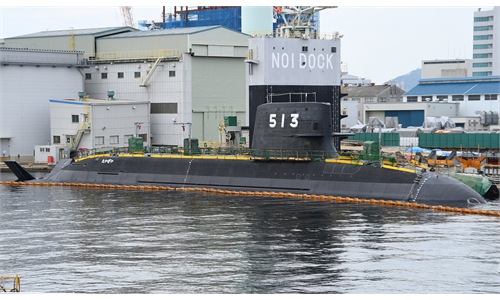
The German Navy Frigate Bayern docked at the International Cruise Terminal in Tokyo on November 5, 2021. Photo: AFP
The Bayern, the German frigate that set off to the Indo-Pacific region in August, arrived in Japan on Friday. According to German officials, the ship held an exercise together with the Japanese Navy this week and will build interoperability skills with the US, Canadian, Australian, and Japanese navies from November 20 to 30.
The Bayern is considered a moderate frigate of the German Navy with limited overall operational performance. It travelled to the region at the invitation of the US for military exchanges and training exercises. In addition, it is also to meet the needs of NATO to strengthen the latter's military presence in the Indo-Pacific region, while demonstrating so-called freedom of navigation.
But in fact, Germany is not as interested as some other countries in showing off their military presence in the Indo-Pacific. Besides, Germany is a defeated country in World War II, so the development of its military capabilities has been greatly restricted. The country's military capabilities, including the capacity of its main battleships, are limited.
The Wall Street Journal reported that Germany has been warier than some other European countries about angering China, and German officials have said that this time the German frigate will not pass through the Taiwan Straits, although it will pass through the South China Sea.
This is a situation China needs to be wary of. We need to monitor whether the Bayern will travel through the Taiwan Straits or sail within the 12 nautical miles of the Nansha and Xisha islands and reefs. If the freedom of navigation of the Bayern is exercised in traditional shipping lanes, then the vessel will represent a harmless German military presence in the Indo-Pacific. We hope that it will not enter these sensitive waters, let alone carry out so-called close reconnaissance of China's territorial waters.
Earlier in the summer, Bayern requested to visit a Chinese port. Even though China denied its entry, it shows that Germany is trying to have military exchanges with the Chinese military. We hope to develop friendly military relations with several countries, including Germany, and we have no objection if German warships arrive in the Indo-Pacific region without the intent to provoke or disturb the peace. After all, warships of any country are free to sail on the open sea. But we will not allow any nation to provoke China's interests, especially its core interests.
Germany in September just held an election and now it has entered the post-Merkel era. Although there are certain variables within Germany-China relations, these factors remain manageable. Due to the huge volume of trade between Germany and China, Berlin attaches great importance to the Chinese market and cooperation with Beijing.
In addition, Merkel's successor Olaf Scholz is better at finding a balance instead of making wholesale changes to Merkel's China policy. Otherwise, the country's interests in the Asia-Pacific region will be damaged. The likely outcome is Berlin will focus on its economic development and political integration, rather than following Washington to provoke Beijing and Moscow in terms of military.
In fact, other European countries, including France and the UK have also sent their warships to the Indo-Pacific region this year. But there is a difference between these countries. On one hand, with the establishment of AUKUS, the UK is determined to cooperate with the US Indo-Pacific Strategy by sending its warships to the Indo-Pacific region to counter China. On the other hand, vessels sent by other European countries, such as France and Germany, are actually of greater political symbolic significance.
The US has its own political and military purposes by asking European countries to show their presence in the Indo-Pacific. These nations, however, will not follow the steps of the US blindly. Moreover, some countries go against Beijing only because of pressure from Washington. Thus, we need to take different measures to handle the China policy of European countries. We can't use just one policy for all European countries.
The author is a Chinese military expert and commentator. opinion@globaltimes.com.cn


